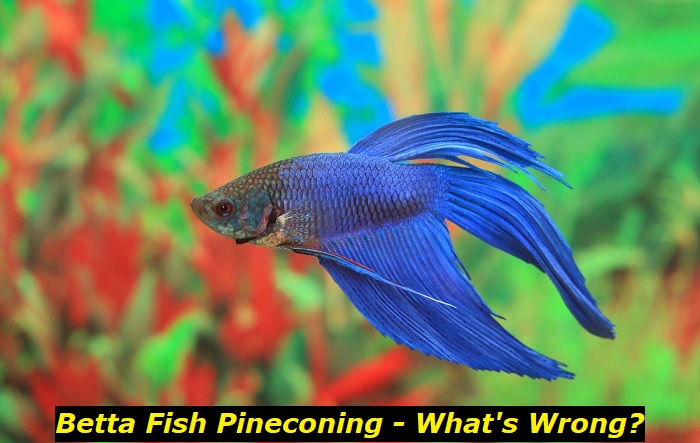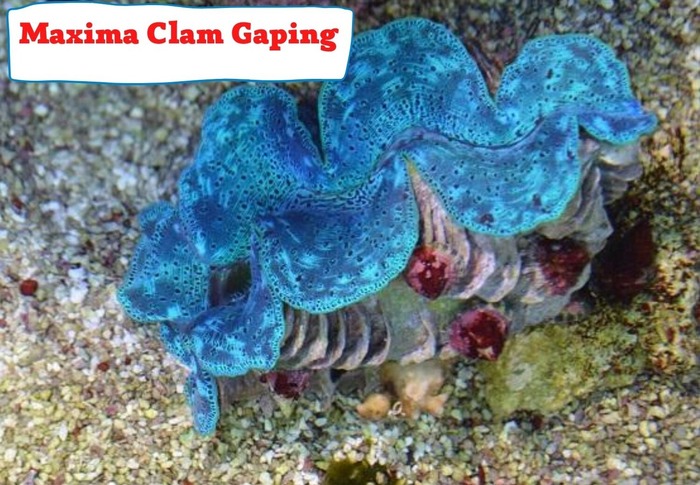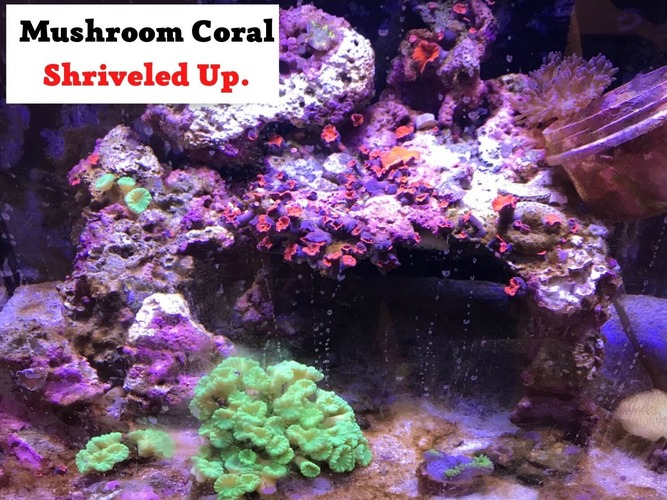Sometimes, you may find your betta fish increase in size with its scales flared up like a pinecone. This is usually a warning to put you on notice of one or more existing health problems. This health problem can also turn out to be a fatal problem if not taken care of in time.
Are you wondering what your betta fish pineconing is warning you about?
Here is a detailed article that discusses some of the main reasons for betta fish pineconing and what you can do to save your fish.

Betta Fish Pineconing
Typically, your betta’s stomach becomes bloated from the swelling of its stomach. The bloating makes your betta’s scales flare up, and this flare gives your betta fish a pinecone appearance; hence the expression Betta fish pineconing.
Sometimes, you may find your betta fish experiencing other symptoms of ill health in addition to the pineconing. One very notorious symptom is bulgy eyes, often called “pop eyes.” Your betta fish’s eyes seem to bulge out of their sockets.
The first step to understanding what pineconing in your betta fish is warning you about is to understand what pineconing is. Pineconing, also known as dropsy disease or pineconing betta scale disease, is not actually a disease. It is usually a sign of an underlying problem or a series of underlying problems.
Many times, the problem that pineconing in your betta fish is trying to warn you about is usually internal. It’s like when you have an injury. Usually, there will be accompanying symptoms, such as redness around the injured area of the body.
You might also experience other secondary symptoms, such as inflammation around that body part. This is exactly how pineconing works in betta; it is usually a sign of an underlying problem.
Pineconing in betta fish can lead to fatal consequences in a very short time. Therefore, how soon you notice pineconing in your betta fish affects its survival chances.
However, your betta fish is less likely to survive the underlying cause of the pineconing if the internal causes are severe and the treatment offered is offered late.
What Does It Warn You About
As mentioned earlier, pineconing in betta fish is a symptom of one or more underlying internal problems in your betta fish. Here are some of the main problems that may cause pineconing in your betta fish.
1) Poor Diet
One of the main reasons your betta fish will bloat and give off a pinecone appearance is to warn you of a poor diet.
Although your betta fish needs all the essential nutrients it can get, there are times when you have to reduce how much protein you feed your fish. This is especially true for aging betta fish.
You do not want to feed your aging betta fish too many high-protein foods. Aging betta fish are more susceptible to digestion issues. Feeding aging betta too much protein may lead to internal problems with their digestive systems.
When this happens, they may begin to bloat and flare their scales as a secondary symptom of the underlying problem.
You want to feed them protein, but you want to do so in moderation.
Feeding poor quality feed can cause malnutrition which may also be an underlying cause of pineconing in your young betta fish. Bettas are naturally carnivores. So, feeding them flakes and other food options that are high in plant matter may not be the best option.
You want to check the content and composition of the feed to ensure that it is high in protein and not fillers or plant matter.
2) Internal Infections
Pineconing can also be a secondary symptom of an internal infection. These infections could be bacterial, fungal, or viral.
If there is a massive infestation of viruses, bacteria, or fungus in the internal organs of your betta fish, you can expect your betta fish to pinecone as a result of the internal infections in its body.
The critical organs to be concerned about are the gills, liver, and kidney. If any of these organs are affected either by bacteria, fungus, or a virus, the integrity of these organs will be compromised, as this will lead to severe health challenges.
If you have treated any fish with an infection from the tank in a while and you find your betta fish pineconing, it may be suffering from a similar or different infection.
3) Stress
Another warning your pineconing betta fish may be giving you is stress. When your betta fish is stressed, it may bloat and flare its scales like a pinecone.
There are many reasons for stress in betta fish, but some of the major reasons are aggression and high bio loads from prolific waste-producing tankmates. Sometimes, this could also be a consequence of inappropriate tank size, especially for a community tank.
Aggressive tank mates may hinder your fish from feeding well, and this will lead to stress and malnutrition. Also, if you house your betta fish with prolific waste producers, they can become susceptible to the stress from the huge bio loads of their waste-producing tank mates.
In other instances, it could also be stress from the transportation of the fish from one tank to another or wrong water parameters. But while short-term exposure to stressful conditions may not hamper your betta’s ability to fight infections, long-term exposure to stress may weaken its immune system and leave it vulnerable to pathogens.
If your fish also becomes vulnerable to several stress factors at the same time, this can lead to multiple health issues, which will cause your betta fish to pinecone.
4) Bad Water Chemistry
Another major warning your pineconing betta fish may be giving you is that the water chemistry of your aquarium water is bad.
Usually, you can tell this from the cloudiness of the water. Water with a high concentration of phosphates, silica, or other heavy metals, in addition to high levels of nitrate, will encourage algae bloom and the growth of harmful microbes and pathogens.
This can lead to severe health issues for your betta fish, as pineconing is only a secondary symptom.
5) Gravid Female Betta Fish
Your betta fish may also be pineconing because it is gravid. Gravid females normally have round, protruding bellies.
It is rare to find a gravid female with flared-up scales as though it were pineconing.
However, there are instances where gravid female bettas have been seen pineconing.
While this is a less alarming sign for the pineconing, you may want to pay attention to the gravid female to be sure she is not displaying any sign of respiratory distress or other concerning symptoms of a health issue.
How To Treat Betta Fish Pineconing
Usually, the underlying problem that caused your betta fish to pinecone would have been caused by many other problems in the tank. These problems are always related. But a rule of thumb for treating pineconing in your betta fish is to act as fast as possible.
If you keep a betta-only tank, the first thing to do is to carry out a 25% partial water change. After that, you want to reduce the water level and raise the temperature in the tank with a water heater. You want to raise the water temperature to about 78°F – 80°F.
Keeping the water level a little low will make it possible for your fish to come up for oxygen if they need to. You can also increase the amount of dissolved oxygen in the tank by adding some air stones with an air pump.
Add some aquarium salt to the tank at half a teaspoonful per gallon to help with the pineconing.
Note: Aquarium salt is not the same as table salt. Use aquarium salt and not table salt!
Administer some antibiotics to the water but only do so in line with the instructions of the antibiotics. You can also soak the food in it for faster relief.
There are some other antibiotics that work when dissolved in water. You can use that method too.
Note: Many medications reduce the level of dissolved oxygen in the water as it affects the water chemistry. You want to ensure that you use air stones with an air pump in addition to a daily 25% partial water change to keep the oxygen levels up.
If you keep a community tank, you want to isolate and quarantine the pineconing betta fish to prevent the spread of the underlying problem. While pineconing is not contagious, the underlying problem causing your Betta to pinecone likely is.
After separating the affected fish, you want to perform the treatment steps above for the quarantined betta fish. But you also want to raise the temperature in your community aquarium to prevent the possibility of another fish swelling and pineconing.
Check the water parameters and chemistry. You also want to ensure that other possible causes of the underlying problems that cause pineconing are prevented.
If you happen to notice the pineconing late, you may have to euthanize your betta fish and disinfect your tank to prevent a possible spread of the disease that caused the pineconing.
- Snail Mantle Collapse – Here’s What Every Pet Owner Should Know - April 2, 2023
- Algaefix Killed My Fish – What Have I Done Wrong? - March 2, 2023
- How Long Can Live Rock Be Out of Water? And What Will Happen Then? - February 2, 2023




